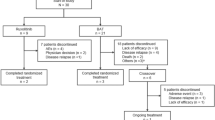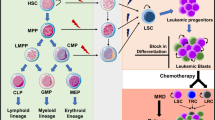Abstract
We compared the outcomes of autologous stem cell transplantation (auto-SCT) with those of allogeneic stem cell transplantation (allo-SCT) from a human leukocyte antigen-matched related donor in patients with Philadelphia chromosome-negative B-lineage acute lymphoblastic leukemia (ALL). Newly diagnosed patients who underwent allo-SCT (n = 486) or auto-SCT (n = 99) after achieving first complete remission (CR) were included. Propensity score matching (PS) and an inverse probability of the treatment weighting (IPTW) analysis were applied to compensate for imbalances in baseline characteristics. The 5 years rates of overall survival (OS) among those in the PS-matched cohorts were 57% [95% confidence interval (CI) 46–67%] for those who received allo-SCT and 44% (95% CI 33–54%) for those who received auto-SCT. Multivariable, propensity score-matched, and IPTW analyses all revealed no statistically significant differences in OS between the two groups [hazard ratios (HR) 0.81, 95% CI 0.53–1.27, p = 0.36; HR 0.84, 95% CI 0.40–1.78, p = 0.65; HR 0.71, 95% CI 0.25–2.02, p = 0.53, respectively]. Prospective trials that include autologous transplantation as a treatment option are needed to examine the potential of autologous transplantation.



Similar content being viewed by others
References
Terwilliger T, Abdul-Hay M. Acute lymphoblastic leukemia: a comprehensive review and 2017 update. Blood Cancer J. 2017;7: e577.
Thomas X, Boiron JM, Huguet F, Dombret H, Bradstock K, Vey N, et al. Outcome of treatment in adults with acute lymphoblastic leukemia: analysis of the LALA-94 trials. J Clin Oncol. 2004;22:4075–86.
Bassan R, Bourquin JP, De Angelo DJ, Chiaretti S. New approaches to the management of adult acute lymphoblastic leukemia. J Clin Oncol. 2018;36:3504–19.
Giebel S, Labopin M, Socie G, Beelen D, Browne P, Volin L, et al. Improving results of allogeneic hematopoietic cell transplantation for adults with acute lymphoblastic leukemia in first complete remission: an analysis from the acute leukemia working party of the european society for blood and marrow transplantation. Haematologica. 2017;102:139–49.
Dhedin N, Huynh A, Maury S, Tabrizi R, Beldjord K, Asnafi V, et al. Role of allogeneic stem cell transplantation in adult patients with Ph-negative acute lymphoblastic leukemia. Blood. 2015;125:2486–96.
Willemze R, Labar B. Post-remission treatment for adult patients with acute lymphoblastic leukemia in first remission: is there a role for autologous stem cell transplantation? Semin Hematol. 2007;44:267–73.
Giebel S, Labopin M, Potter M, Poire X, Sengeloev H, Socie G, et al. Comparable results of autologous and allogeneic haematopoietic stem cell transplantation for adults with Philadelphia-positive acute lymphoblastic leukaemia in first complete molecular remission: an analysis by the acute leukemia working party of the EBMT. Eur J Cancer. 2018;96:73–81.
Hagop Kantarjian MD, Elias Jabbour MD. Incorporating immunotherapy into the treatment strategies of B-Cell adult acute lymphoblastic leukemia: the role of blinatumomab and inotuzumab ozogamicin. In: ASCO educational book. American Society of Clinical Oncology Alexandria; 2018. p. 574–8.
Kato H, Kawase T, Kako S, Mizuta S, Kurokawa M, Mori T, et al. Analysis of outcomes following autologous stem cell transplantation in adult patients with Philadelphia chromosome-negative acute lymphoblastic leukemia during first complete remission. Haematologica. 2014;99:e228–30.
Atsuta Y. Introduction of Transplant Registry Unified Management Program 2 (TRUMP2): scripts for TRUMP data analyses, part I (variables other than HLA-related data). Int J Hematol. 2016;103:3–10.
Rosenbaum PRRD. Constructing a control group using multivariate matched sampling methods that incorporate the propensity score. Am Stat. 1985;39:33–8.
LA Griswold ME, Mulrow C. Propensity score adjustment with multilevel data: setting your sites on decreasing selection bias. Ann Intern Med. 2010;152:393–5.
Austin PC. An introduction to propensity score methods for reducing the effects of confounding in observational studies. Multivariate Behav Res. 2011;46:399–424.
Takeuchi J, Kyo T, Naito K, Sao H, Takahashi M, Miyawaki S, et al. Induction therapy by frequent administration of doxorubicin with four other drugs, followed by intensive consolidation and maintenance therapy for adult acute lymphoblastic leukemia: the JALSG-ALL93 study. Leukemia. 2002;16(7):1259–66.
Jinnai I, Sakura T, Tsuzuki M, Maeda Y, Usui N, Kato M, et al. Intensified consolidation therapy with dose-escalated doxorubicin did not improve the prognosis of adults with acute lymphoblastic leukemia: the JALSG-ALL97 study. Int J Hematol. 2010;92:490–502.
Sakura T, Hayakawa F, Sugiura I, Murayama T, Imai K, Usui N, et al. High-dose methotrexate therapy significantly improved survival of adult acute lymphoblastic leukemia: a phase III study by JALSG. Leukemia. 2018;32:626–32.
Saito H, Ito M, Kato S, Kodera Y, Okamoto S, Taniguchi S, et al. The Japan Marrow Donor Program, 25 years of experience in achieving 20,000 bone marrow transplantations: organization structure, activity, and financial basis. Bone Marrow Transplant. 2018;53:609–16.
Giebel S, Stella-Holowiecka B, Krawczyk-Kulis M, Gokbuget N, Hoelzer D, Doubek M, et al. Status of minimal residual disease determines outcome of autologous hematopoietic SCT in adult ALL. Bone Marrow Transplant. 2010;45:1095–101.
Inaba H, Greaves M, Mullighan CG. Acute lymphoblastic leukaemia. Lancet. 2013;381:1943–55.
Gorin NC, Giebel S, Labopin M, Savani BN, Mohty M, Nagler A. Autologous stem cell transplantation for adult acute leukemia in 2015: time to rethink? Present status and future prospects. Bone Marrow Transplant. 2015;50:1495–502.
Jabbour E, O’Brien S, Konopleva M, Kantarjian H. New insights into the pathophysiology and therapy of adult acute lymphoblastic leukemia. Cancer. 2015;121:2517–28.
Dhedin N, Dombret H, Thomas X, Lheritier V, Boiron JM, Rigal-Huguet F, et al. Autologous stem cell transplantation in adults with acute lymphoblastic leukemia in first complete remission: analysis of the LALA-85, -87 and -94 trials. Leukemia. 2006;20:336–44.
Goldstone AH, Richards SM, Lazarus HM, Tallman MS, Buck G, Fielding AK, et al. In adults with standard-risk acute lymphoblastic leukemia, the greatest benefit is achieved from a matched sibling allogeneic transplantation in first complete remission, and an autologous transplantation is less effective than conventional consolidation/maintenance chemotherapy in all patients: results of the International ALL Trial (MRC UKALL XII/ECOG E2993). Blood. 2008;111:1827–33.
Ribera JM, Oriol A, Bethencourt C, Parody R, Hernández-Rivas JM, Moreno MJ, et al. Comparison of intensive chemotherapy, allogeneic or autologous stem cell transplantation as post-remission treatment for adult patients with high-risk acute lymphoblastic leukemia. Results of the PETHEMA ALL-93 trial. Haematologica. 2005;90:1346–56.
Wetzler M, Watson D, Stock W, Koval G, Mulkey FA, Hoke EE, et al. Autologous transplantation for Philadelphia chromosome-positive acute lymphoblastic leukemia achieves outcomes like allogeneic transplantation: results of CALGB Study 10001 (Alliance). Haematologica. 2014;99:111–5.
Acknowledgements
The authors would like to thank all the physicians and staff members of the collaborating institutes of the JSCTC. The authors would also like to thank the JMDP, and the Japan Cord Blood Bank Network, who made this analysis possible. The authors wish to acknowledge with thanks the assistance of Dr. Keitaro Matsuo in the preparation of the manuscript.
Author information
Authors and Affiliations
Corresponding author
Ethics declarations
Conflict of interest
The authors declare no conflict of interest.
Additional information
Publisher's Note
Springer Nature remains neutral with regard to jurisdictional claims in published maps and institutional affiliations.
About this article
Cite this article
Mizuta, S., Ugai, T., Kato, H. et al. Propensity score matching/reweighting analysis comparing autologous and allogeneic stem cell transplantation for B-lineage acute lymphoblastic leukemia. Int J Hematol 116, 393–400 (2022). https://doi.org/10.1007/s12185-022-03368-y
Received:
Revised:
Accepted:
Published:
Issue Date:
DOI: https://doi.org/10.1007/s12185-022-03368-y




